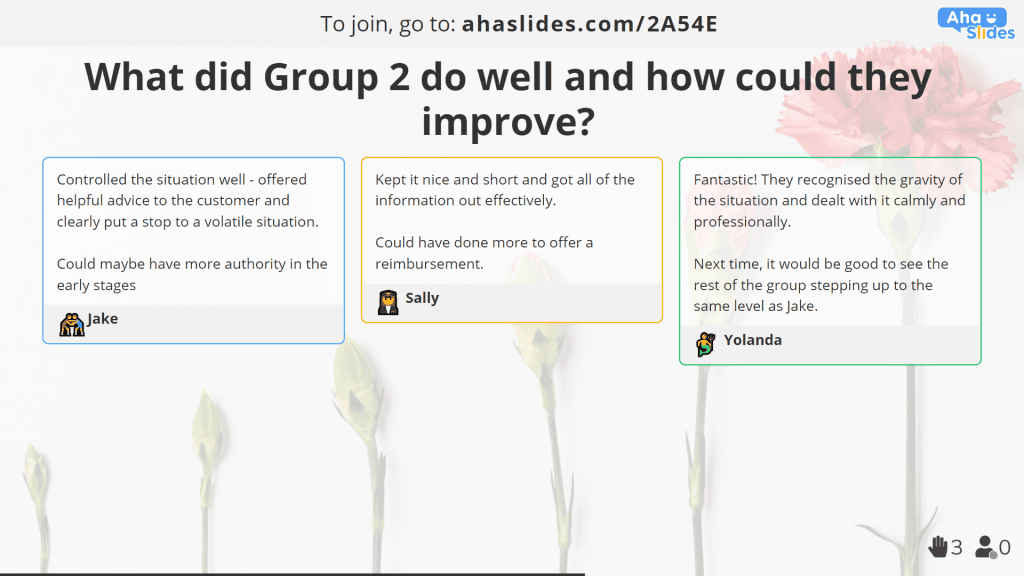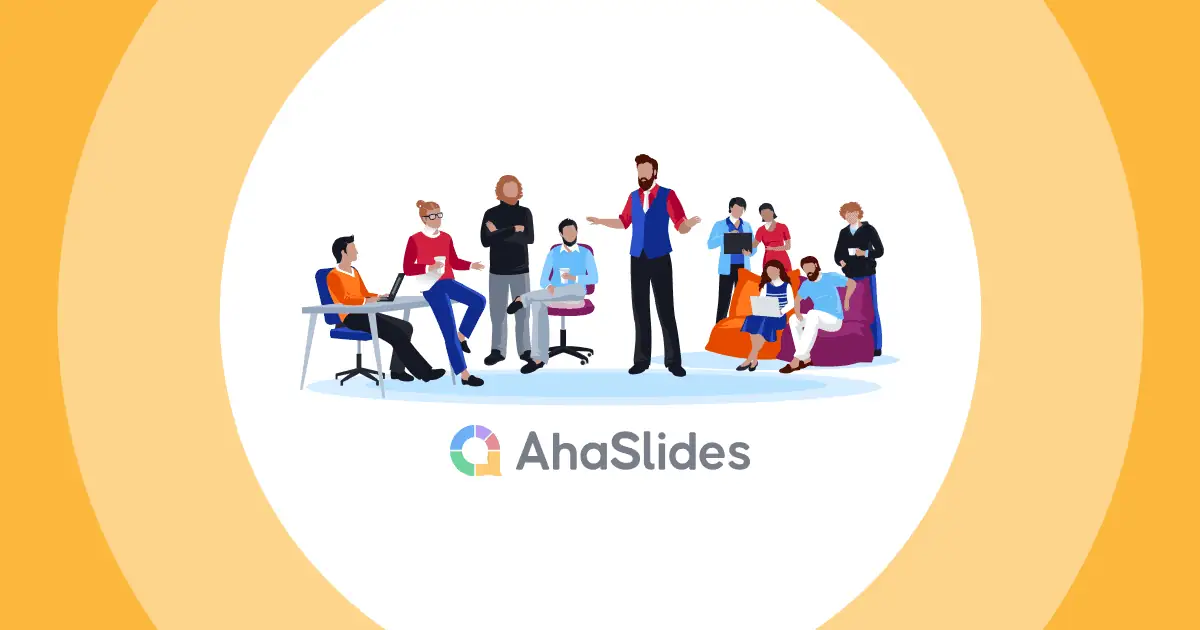智力與 領導情商?對一位偉大的領導者來說,哪個比較重要?請參閱 2024 年 AhaSlides 最佳指南
關於高情商的領導者是否比高心智的領導者更擅長領導和管理,一直存在爭議。
世界上許多偉大的領導者都擁有高智商,但這並不能保證光有智商而沒有情緒智商就能成為成功的領導者。了解情緒智商在領導力中的本質,可以幫助管理團隊做出正確的選擇和決策。
本文不僅將著重於解釋情商的概念,還將進一步深入了解情商在領導力中的作用以及如何實踐這一技能。
Overview
| 誰發明了「情商」? | 博士丹尼爾·戈爾曼 |
| 「情商」是什麼時候發明的? | 1995 |
| 誰首先使用「情商」這個術語? | 新罕布什爾大學的約翰·D·梅耶爾 (John D. Mayer) 和耶魯大學的彼得·薩洛維 (Peter Salovey) |
目錄

AhaSlides 的更多提示
什麼是情商?
情商的概念被廣泛使用 丹尼爾·戈爾曼 在 1990 年代首次出現,但在 1964 年邁克爾·貝爾多奇 (Michael Beldoch) 的一篇論文中首次出現,這表明某人有能力感知和監控自己和他人的情緒,並利用它們來引導他人的思想和行為。
高情商領導者的例子
- 表達他們的開放、尊重、好奇和積極傾聽他人的故事和感受,而不用擔心冒犯他們
- 培養集體目標感和實現這些目標的戰略計劃
- 為自己的行為和錯誤負責
- 產生和鼓勵熱情、確定性和樂觀,以及建立信任和協作
- 提供多種視角來激發組織的變革和創新
- 建立一致性組織文化
- 知道如何控制自己的情緒,尤其是憤怒或失望
您擅長哪些情緒智商技能?
在介紹「如何成就領導者」這篇文章時, 丹尼爾·戈爾曼 定義的領導情商有 5 個要素,解釋如下:
#1。 自我意識
了解自己的感受及其背後的原因是理解他人情緒的第一步。這也關乎你理解自身優勢和劣勢的能力。當你身處領導職位時,你應該意識到你的哪些情緒會對員工產生正面或負面的影響。
#2。 自我調節
自我調節是指控制情緒,並根據不斷變化的環境進行調整。它包括從沮喪和不滿中恢復過來,以符合自身價值觀的方式行事的能力。領導者無法妥善控制憤怒或暴怒,也無法保證團隊的效率。他們更害怕做錯事,而不是有動力去做正確的事。這是截然不同的兩回事。
#3. 同情
很少有領導者能夠設身處地為他人著想,尤其是在決策時,因為他們必須將任務完成和組織目標放在首位。高情商的領導者會深思熟慮,認真對待你的任何行動和他們所做的任何決定,以確保團隊中沒有人被遺棄,也不會發生不公平的問題。
#4。 動機
約翰漢考克曾說:「商業中最偉大的能力是與他人和睦相處並影響他們的行為。」但你該如何與他人和睦相處並影響他們呢?激勵是領導力情商的核心。它關乎一種強烈的願望,不僅為自己實現模糊但現實的目標,也鼓勵下屬加入他們的行列。領導者必須了解員工的激勵因素。
#5。 社交技能
社交技巧關乎與他人的相處,換句話說,就是關係管理。戴爾‧卡內基曾說:「與人交往時,記得你面對的不是邏輯的生物,而是情感的生物。」這句話似乎千真萬確。社交技巧與優秀的溝通者息息相關。他們始終是團隊成員效仿的最佳行為和紀律典範。

為什麼情商在領導力中如此重要?
情商在領導力中的作用是不可否認的。 現在似乎是領導者和管理者利用情商來提高領導效率的時候了。 不再有使用懲罰和權力來強迫他人服從你的規則的時代,尤其是在商業領導、教育培訓、服務行業等領域。
歷史上有許多情商領導力的理想典範,它們對數百萬人產生了強烈影響,並像小馬丁·路德·金一樣努力建設一個更美好的世界。
他以展現高情商而聞名,他能激勵和鼓舞人們與他一起捍衛正義和平等。身為領導力中情商最典型的典範之一,馬丁路德金恩用最真誠的情感和同情心與聽眾分享共同的價值觀和未來願景,從而與聽眾建立聯繫。
情緒智商在領導力中的陰暗面是指將其作為一種技巧,操縱人們的思維或引發負面情緒,以達到有害的目的,亞當·格蘭特的書中也提到了這一點。如果使用不當,它將是一把雙面刃。
領導力中運用情緒智商的最具代表性的反面例子之一就是阿道夫·希特勒。他很快意識到情緒智商的力量,於是巧妙地透過表達情緒來說服人們,最終導致個人崇拜,他的追隨者「不再批判性思考,只顧著表達情緒」。
如何在領導力中練習情商?
在《原始領導力:卓越績效的隱藏驅動力》一書中,作者將情緒型領導風格分為六類:權威型、教練型、親和型、民主型、標竿型和強制型(丹尼爾·戈爾曼、理查德·博亞齊斯和安妮·麥基,2001 年)。選擇情緒型領導風格時務必謹慎,因為你無法預知每種風格對你所領導的人的情緒和直覺究竟有多大的影響。
以下是在領導力中練習情商的 5 種方法:
#1。 練習正念
注意您所說的內容和您的用詞。 以最謹慎和周到的方式練習思考可以幫助管理和回應自己的情緒。 它還有助於減少您的負面情緒,並且您不太可能感到精疲力竭或不知所措。 您可以花時間寫日記或在一天結束時反思您的活動。
#2。 接受反饋並從中學習
你可以嘗試安排一次驚喜的咖啡或零食時間,與員工溝通並傾聽他們的心聲,這有助於增進情感連結。你也可以進行調查,了解員工的真正需求以及激勵他們的因素。這種深入的對話和調查能夠提供大量有價值的資訊。正如你從那些高情商的著名領導者身上所看到的,誠實且高品質的溝通是獲得團隊回饋的最佳方式。無論回饋是正面的還是負面的,都要接受,並在看到這些回饋時,學會克制自己的怨恨或激動。不要讓它們影響你的決定。

#3。 了解肢體語言
投入時間和精力深入學習洞察肢體語言的世界絕非徒勞無功。沒有什麼比觀察肢體語言更能辨識他人情緒的方法了。特定的手勢、語調、眼神……都能揭示他們真實的想法和感受。切勿忽視他們行為中的任何細節,這能幫助你更好地解讀真實的情緒,並迅速而恰當地做出回應。
#4。 了解津貼和懲罰
如果您正在考慮哪種津貼或懲罰更能激勵員工,請記住,用蜂蜜比用醋能抓到更多的蒼蠅。 不知何故,許多員工在工作出色或取得成就時喜歡聽到經理的表揚,而且他們會繼續表現得更好。
據說,約 58% 的工作成功取決於情商。 在某些情況下需要懲罰,特別是當你想保持平等和信任並防止衝突時。
#5。 參加在線課程或培訓
如果您不遇到它,您將永遠不知道如何解決它。 有必要參加有關提高情商的培訓或課程。 您可以考慮讓您有機會與員工互動並練習靈活場景的培訓。 您還可以在培訓課程中學習解決衝突的各種方法。
此外,您可以通過不同的團隊建設活動為您的員工設計全面的情商培訓,以培養同理心並促進更好地理解他人。 這樣,您就有機會觀察他們在玩遊戲時的行為、態度和行為。
關鍵要點
那麼你想成為什麼樣的領導者? 基本上,在領導力中使用情商沒有絕對的對錯,因為大多數事情就像同一枚硬幣的兩面。 在追求短期和長期目標的過程中,領導者需要考慮裝備自己的情商技能。
無論您選擇實踐哪種領導風格, 啊哈幻燈片 適當地最好的教育和培訓工具,以幫助領導者培訓和吸引員工,以提高團隊效率和凝聚力。 嘗試 啊哈幻燈片 從而立即提高團隊的表現。
常見問題(FAQ)
什麼是情商?
情緒智商 (EI) 是指辨識、理解和管理自身情緒,以及有效引導和回應他人情緒的能力。它涵蓋一系列與情緒意識、同理心、自我調節和社交互動相關的技能。因此,情緒智商對於領導職位而言是一項極為重要的技能。
情商有多少種類型?
有五個不同的類別:內部動機、自我調節、自我意識、同理心和社會意識。
情商分為哪三個級別?
三個級別包括依賴型、自主型和協作型。









